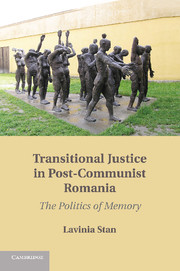Crossref Citations
This Book has been
cited by the following publications. This list is generated based on data provided by Crossref.
Savelsberg, Joachim J.
and
McElrath, Suzy
2014.
Crime, Law, and Regime Change.
Annual Review of Law and Social Science,
Vol. 10,
Issue. 1,
p.
259.
Ciobanu, Monica
2015.
Remembering the Romanian Anti-Communist Armed Resistance: An Analysis of Local Lived Experience.
Eurostudia,
Vol. 10,
Issue. 1,
p.
105.
Grigore, Monica
2015.
The Aiud “Prison Saints.” History, Memory, and Lived Religion.
Eurostudia,
Vol. 10,
Issue. 1,
p.
33.
Preda, Caterina
2015.
Le rôle de la nostalgie dans la mémoire artistique du passé communiste dans la Roumanie contemporaine.
Canadian Slavonic Papers,
Vol. 57,
Issue. 3-4,
p.
268.
Horne, Cynthia
2015.
“Silent Lustration”: Public Disclosures as Informal Lustration Mechanisms in Bulgaria and Romania.
Problems of Post-Communism,
Vol. 62,
Issue. 3,
p.
131.
Damşa, Liviu
2016.
The Transformation of Property Regimes and Transitional Justice in Central Eastern Europe.
Vol. 8,
Issue. ,
p.
21.
Damşa, Liviu
2016.
The Transformation of Property Regimes and Transitional Justice in Central Eastern Europe.
Vol. 8,
Issue. ,
p.
1.
Wisser, Katherine M.
and
Blanco-Rivera, Joel A.
2016.
Surveillance, documentation and privacy: an international comparative analysis of state intelligence records.
Archival Science,
Vol. 16,
Issue. 2,
p.
125.
Espindola, Juan
2017.
Why Historical Injustice Must be Taught in Schools.
Studies in Philosophy and Education,
Vol. 36,
Issue. 1,
p.
95.
Kochanski, Adam
2018.
The “Local Turn” in Transitional Justice: Curb the Enthusiasm.
International Studies Review,
Angelovska, Despina
2020.
Societies in Transition.
p.
259.
Bădescu, Gruia
2021.
Homelands and dictators: migration, memory, and belonging between Southeastern Europe and Chile.
Journal of Contemporary European Studies,
p.
1.
Stryjek, Tomasz
2022.
Populizm historyczny i kryzys demokracji. Węgry i Polska na tle Europy Środkowo-Wschodniej.
Studia Środkowoeuropejskie i Bałkanistyczne,
Vol. 31,
Issue. ,
p.
81.
Huszka, Beáta
2023.
Restitutio Interruptus
: Minority Churches, Property Rights and Europeanisation in Romania
.
Europe-Asia Studies,
Vol. 75,
Issue. 9,
p.
1453.
2023.
Circulations en éducation.
p.
282.
Hirsekorn, Ute
and
Vice, Sue
2023.
The Palgrave Handbook of Testimony and Culture.
p.
567.
Painca, Diana
2023.
Les mémoires de prison postcommunistes roumains et la poétique de la résilience du moi.
Philologica Jassyensia,
Vol. 37,
Issue. 1,
p.
219.
Avram, Kristine Andra
2024.
Listening to, Reconstructing, and Writing about Stories of Violence: A Research Journey Amidst Personal Loss.
Genealogy,
Vol. 8,
Issue. 1,
p.
14.
McDonald, Dave
2024.
The Work of Acknowledgment: ‘Loud Fence’ as Community-Level Response to Institutional Child Sexual Abuse Testimony.
Social & Legal Studies,
Vol. 33,
Issue. 2,
p.
213.





